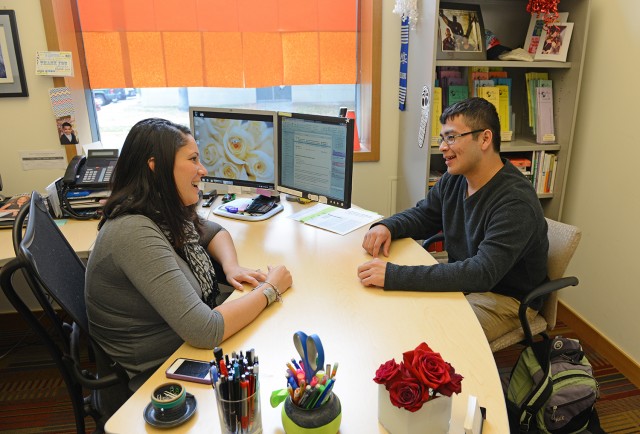‘Connections’ Mentoring Program Eases Students’ Transition to Wesleyan

For first-year students, leaving home and starting a new life at Wesleyan can be exhilarating—but it’s also a major adjustment. Students who find themselves in need of a little extra support now have the option to be matched with faculty or staff mentors to help ease the transition, thanks to a new program from the Office of Student Affairs and the Office of Diversity and Institutional Partnerships.
The Connections Mentoring Program, which started as a small pilot in the 2011-12 school year, recently was expanded to any first-year student who wants mentoring. There are currently 49 mentors and 70 mentees, including 50 first-year students and 20 upperclass students, and the program continues to grow.
According to Dean for Diversity and Student Engagement Renee Johnson-Thornton, back in 2011, she and other deans were approached by male students of color who were experiencing some difficulties acclimating to life at Wesleyan, but felt they had nowhere to take their concerns. Looking to channel these concerns in a productive way, the class deans and the Office of Diversity and Institutional Partnerships hosted two dinner and discussion events in the 2011-12 school year to get feedback from the students. The men voiced their desire to have mentors to help guide them during their time at Wesleyan.
Elisa Cardona, director of student activities and leadership development, said the program coordinators decided to implement a small mentoring program, pairing faculty and staff with students. They initially sought help from the Student of Color Coalition to identify students who would benefit from mentoring, and recruited faculty and staff mentors from the Administrators and Faculty of Color Alliance (AFCA).
Over time, the coordinators decided to build a family model for the mentoring program. Each mentor would be matched with a first-year student. The next year, the pair would stay together, while a new first-year student would be added to “the family.” Eventually, the family would include one member from each class year. This would help build trust in the arrangement amongst new students—who could see that their mentor already had positive relationships with other students—and give younger students the option to discuss certain matters with other, more experienced students.
The family model also allows older students to take on a leadership role, which is beneficial for their personal development, added Louise Brown, dean for the class of 2017, dean for academic advancement and a program coordinator. She noted that first-year students who are mentees this year will have the opportunity to continue as mentees next year, while also serving as mentors to members of the Class of 2018.
This August, the program was expanded beyond students of color to include all first-year students, so that any student who wanted a mentor could participate. The coordinators found a great demand among students, and put out a call to recruit more mentors.
“We have such a large pool of students who want to participate in the program, we’ve actually given some mentors two first-year students,” said Johnson-Thornton.
All participants are asked to fill out questionnaires about themselves, and then are matched according to their backgrounds. For example, Brown was matched with a student from her home state of Minnesota. Cardona, who is Latina and a first-generation college student, was paired with a Latino first-generation college student.
Marina Melendez, dean for the class of 2014, interim chief diversity officer, and a coordinator of the program, noted that the faculty and staff who participate as mentors are all volunteering their time, going above and beyond their job descriptions. To thank them and encourage their connection, Vice President for Student Affairs Michael Whaley has offered all mentoring groups vouchers to eat lunch at Daniels Family Commons, while Director of the Center for the Arts Pamela Tatge has offered free tickets to CFA performances.
While faculty members often mentor students in a variety of formal and informal capacities, Melendez has been especially impressed by the number of staff members who have stepped up to be mentors. In addition, a large number of cabinet members have volunteered, including Provost and Vice President for Academic Affairs Ruth Striegel Weissman, Director of Strategic Initiatives Charles Salas, and Vice President for Information Technology and Chief Information Officer David Baird.
Tracy Mehr-Muska, University Protestant Chaplain, said she decided to sign up as a mentor “because I attribute a large portion of my happiness and much of what I have accomplished in my life to caring, attentive, wise mentors.” In particular, she pointed to the long-time pastor of her childhood church, and to women who served alongside her in the Coast Guard, where they were greatly outnumbered by men. “I found such inspiration and hope in speaking with women senior to me who had been successful and had persevered in the midst of the difficulties and loneliness,” she said.
“I connected with Wesleyan’s mentoring program with the hope of mentoring and supporting individuals who may feel marginalized and who perhaps are trying to figure out where they fit in the world, trying to balance their authentic selves and society’s expectation of assimilation,” Mehr-Muska added.
Anyone who is interested in getting involved in the program as a mentor or mentee should e-mail connections@wesleyan.edu.

